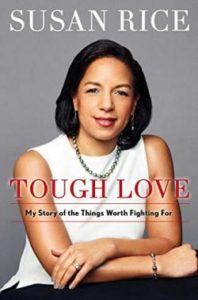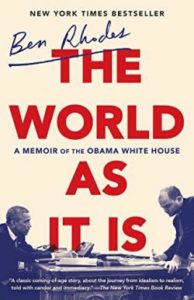Will the post–Cold War era in which U.S. foreign policy addressed such high-minded causes as nonproliferation, democracy promotion and humanitarian intervention turn out to have been a mere parenthesis between superpower competition?
Foreign policy analyst Peter Beinart suggest as much in a review of Tough Love: My Story of the Things Worth Fighting For by Susan Rice, Samantha Power’s The Education of an Idealist: A Memoir and The World as It Is: A Memoir of the Obama White House by Ben Rhodes.
 “Although none of the authors puts it this way, it’s possible to read their books not only as tales of tempered idealism but also as chronicles of America’s declining exceptionalism,” he writes for Foreign Affairs:
“Although none of the authors puts it this way, it’s possible to read their books not only as tales of tempered idealism but also as chronicles of America’s declining exceptionalism,” he writes for Foreign Affairs:
In retrospect, the belief in democracy promotion and humanitarian intervention that Rice, Power, and Rhodes embraced early in their careers rested on a faith that democracy was stable at home. With that faith now eroded—and the United States battling its own rising tribalism, authoritarianism, and brutality—it is hard to imagine a book like Power’s “A Problem From Hell,” a critique of the country’s repeated failure to stop genocide, becoming the sensation it did in 2002. As Americans have grown more preoccupied with, and more pessimistic about, their own country’s moral condition, they have turned inward.
“In each, the saga of disillusionment reaches its nadir in 2016, with Russia’s electoral interference,” Beinart adds. “After witnessing the limits of the United States’ ability to defend democracy and human rights abroad, Rice, Power, and Rhodes realize to their horror the limits of its ability to defend those principles at home.”
 Near the end of her book, he writes, Power acknowledges, “While I once viewed the conflict in Bosnia as a last gasp of ethnic chauvinism and demagoguery from a bygone era, it now seems more of a harbinger of the way today’s autocrats and opportunists exploit grievances . . . in order to expand their own power.”
Near the end of her book, he writes, Power acknowledges, “While I once viewed the conflict in Bosnia as a last gasp of ethnic chauvinism and demagoguery from a bygone era, it now seems more of a harbinger of the way today’s autocrats and opportunists exploit grievances . . . in order to expand their own power.”
At the same time, Power said, despite “the human rights recession,” we are “still at or near an all-time high for democracy around the world.”
From Hong Kong to Turkey to Egypt, she cited examples of “the inexhaustible aspiration people have to hold their leaders accountable and to be treated better,” at an event (above) co-sponsored by the Harvard Law School Library and Harvard Law School’s International Legal Studies.
 Power was a table-pounding idealist and human rights advocate, and believed in using American power to protect innocent civilians and advance democracy. And lately I have struggled with that position, Thomas Friedman writes for The New York Times:
Power was a table-pounding idealist and human rights advocate, and believed in using American power to protect innocent civilians and advance democracy. And lately I have struggled with that position, Thomas Friedman writes for The New York Times:
Samantha discusses what she learned as an Irish immigrant, the personality traits of good diplomats (and war correspondents), relations with China, why democracy is so rare in the Middle East, the truth about Richard Holbrooke, what factors mitigate against humanitarian intervention, her favorite memoir, how to get NATO members to spend more on defense, and whether baseball games are too long.
“In retrospect, the entire post–Cold War era that framed the careers of Rice, Power, and Rhodes—an era in which U.S. foreign policy focused on counter-terrorism, nuclear nonproliferation, democracy promotion, economic liberalization, and humanitarian intervention—may turn out to have been merely a parenthesis between superpower competitions,” Beinart suggests. RTWT







